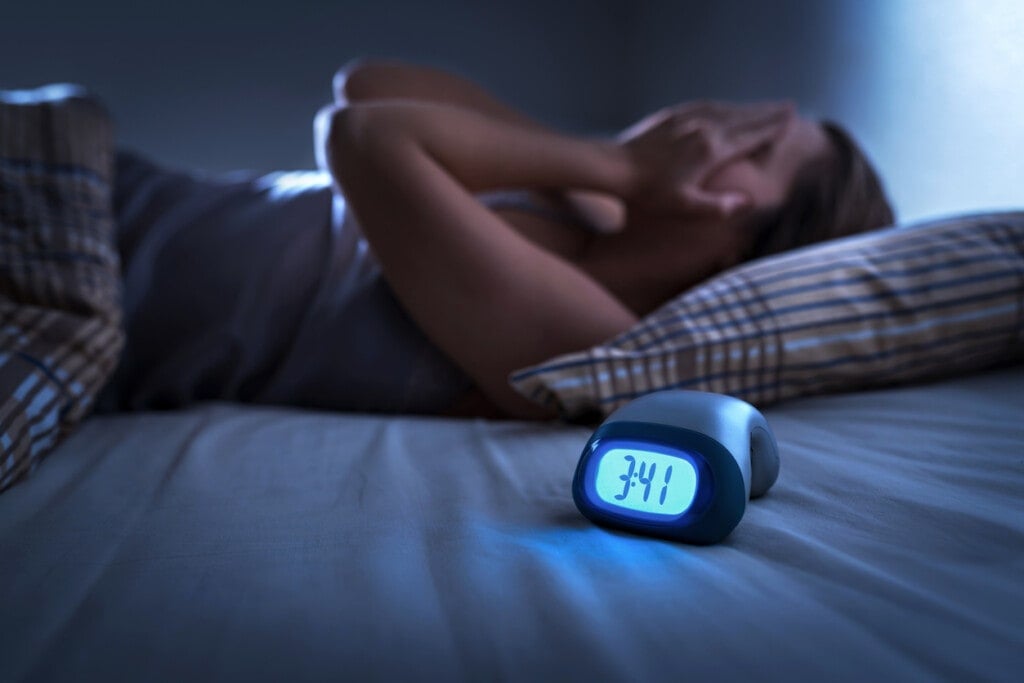Whether you’re a full-time working mom, a part-time working mom, or a stay-at-home parent, when the final bedtime story has been read and it’s time for lights out, it’s been a long day. We can all relate to how well we function, how good we feel when we have gotten sufficient sleep, and how lousy we feel when postpartum insomnia hits. Your body wants to shut off, but your brain isn’t getting the memo, and sleep is nowhere in sight. You can feel the anxiety crawl up your chest as the minutes tick by. The baby will be up before you know it. You’re exhausted, and you’ve been waiting to recharge all day. So, why are you wide awake?
Before you had kids, friends and family likely teased you about getting sleep while you still could. You probably laughed and nodded at the time, but looking back; you didn’t know what was in store. Postpartum insomnia is a real issue, not just affecting new moms. It’s common for moms up to two years postpartum but can be a persistent issue if you ignore it.
Postpartum Insomnia Rates Higher Than Other Women
Rates of insomnia disorder up to two years postpartum range from around 30 percent to 50 percent, compared to about 11 percent of women in the general population. More than half of the patients licensed clinical health psychologist Dr. Shantha Gowda sees in her clinic say their insomnia began after the birth of their first child.1
“Professionally and personally, I can say that it’s an extremely common phenomenon,” says Dr. Gowda. But while it’s a widespread issue, that doesn’t mean moms need to accept sleepless nights as the norm.
Dr. Molly Atwood, Ph.D., director of the Clinical Training Behavioral Sleep Medicine Program at Johns Hopkins, notes that while insomnia is more common for mothers compared to other people, there are some things moms can do to improve the rest they get and wake up refreshed.1
What Contributes to Postpartum Insomnia?
Often, new mothers experience fatigue and sleep loss, known as sleep deprivation. The opportunities for sleep narrow to a window of time after you bring your baby home from the hospital. With constant feedings, diaper changes, chores, and other tasks taking the forefront, it’s essential to prioritize and plan for our sleep just as much as we do for our babies. But postpartum insomnia is a different beast that can plague even the most desperate dream chasers.8
Stressful physical and mental changes during postpartum, including a drop in estrogen and progesterone after delivery, can contribute to nighttime wakefulness as they influence the circadian rhythms, specifically due to the impact of progesterone which has sedative properties and also is linked with melatonin levels (which impact sleep).2
Sign of Postpartum Insomnia
“Racing thoughts in particular, often called rumination, is a symptom of insomnia and is typically due to over-activation of the brain’s frontal cortex,” says Dr. Gowda. Racing thoughts and increased heart rate are common symptoms of anxiety and stress that engage our sympathetic nervous system, which causes us to feel more alert and on guard, releasing our body’s stress hormone, cortisol.
“There are several reasons why the fight or flight response might be overactive at night, including thinking about problems or issues that have not been adequately addressed or processed during the day, thinking about to-dos or planning for the next day, or worrying about the future including whether or not you or your infant will sleep,” explains Dr. Atwood. “If you are too focused on getting sleep, you might wonder when your infant will wake you again and how much sleep you have left before you need to face the demands of the day.”
Plus, repeatedly tossing and turning in bed might do more harm than good. When you try too hard to produce sleep when you’re unable or ready to, the body starts associating these states with the bed. While you might even try to cope with sleep loss by spending more time in bed, napping, or canceling activities because you’re too tired or for fear that plans will interfere with the next night’s sleep, you may create a chronic insomnia issue.
How Can Moms Overcome Postpartum Insomnia?
If you have difficulty with postpartum insomnia, it can feel close to impossible not to fixate on it. Instead, it can be helpful to get out of bed and do something pleasant and relaxing until you feel sleepy, like making a soothing tea or practicing a gentle five-minute meditation or stretch, and then returning to bed. Is sleep escaping you? Give these methods a try:
Set Aside Problem-Solving Time
While many of us stay up late at night trying to solve the world’s problems, it’s best to set aside specific problem-solving time to prevent anxious thoughts or restless minds before we settle in under the covers.
“If disruptive thinking is commonly occurring in bed, it may be helpful to set aside time during the day or early evening to do the thinking, processing, problem-solving, and planning you need to do,” suggests Dr. Atwood. “If disruptive thinking returns at night, remind yourself that you will have time to address it tomorrow and refocus your attention on something relaxing and pleasant.”
Sync Up Your Sleep Schedule
If you are desperate for quality sleep, it might be tempting to sneak in some extra shuteye on an evening when the baby goes down earlier than expected. But beware of forcing yourself to bed at 6:30 in the evening just because you want to play catch up; experts say it could have a counter effect. Instead, it’s best not to go to bed until you are sleepy and never before your regular bedtime.
“Waiting until you are sleepy helps to ensure that your body has enough drive for deep sleep,” says Dr. Atwood. “Keep the same wake-up time every day, no matter how much sleep you got the night before, and limit napping. Sleeping in and napping will reduce the amount of drive you have for deep sleep the following night, which could contribute to longer awakenings or greater difficulty initially falling asleep.” If you need to nap, limiting daytime naps to no more than 30 minutes is a good idea.9
Create a Bedtime Buffer Zone
You’re likely familiar with the harmful effects of blue lights our electronic devices omit, but does that stop you from limiting your exposure before bedtime? While all types of visible light can affect circadian rhythms, blue light has the most significant impact because it stimulates parts of the brain that make us feel alert, elevating our body temperature and heart rate.3
“Practice good sleep hygiene in addition to minimizing naps and caffeine, such as relaxing and unwinding before bed, minimizing work, phones, and other screens in bed,” says Dr. Gowda. Finding the right ritual for you may take some trial and error, but after repeating a new wind-down process, your brain will begin associating your new pattern with rest. “Create a buffer zone before bed, consisting of relaxing and enjoyable activities only, under dim lighting,” suggests Dr. Atwood. “This will help relax your body and prepare it for sleep.”
Home In On Happy Habits
Pay attention to how much physical activity, sunlight, and caffeine your body is exposed to daily. Because caffeine tends to remain in your system for long periods, leading to a disruption in sleep quality, it’s important to be mindful of the quantity and timing of your caffeine consumption. Physical movement – even short-distance light walking can also help tire your body out and promote restful nighttime sleep. If getting outside for some fresh air and sunshine isn’t an option in the mornings or afternoons, even sitting near a window can be helpful.4,5,6
Consider Sleep Science
If insomnia is a more consistent problem, you can seek a specialist trained in cognitive behavioral therapy for insomnia, known as CBTi.
“It’s a non-pharmacological treatment focused on the behavioral, physiological, and psychological factors that interfere with sleep,” explains Dr. Gowda. Therapist-assisted CBTi and light-dark therapy (LDT) have been proven safe and efficient in reducing postpartum insomnia symptoms during the first postpartum year. This medication-free, short-term therapy provides sleep education and works to improve the way you think about and approach sleep.7
Remember: Sleeplessness is Normal
Knowing that sleeplessness after welcoming your new baby home is not only expected but also temporary is often enough to help get many women through this phase. During the first few months postpartum, accepting that your baby will not sleep through the night is essential. Research indicates that sleep can be impacted for up to two years postpartum.2
Regardless of whatever sleep training methods you deploy, believing you will not wake in the middle of the night to care for your baby’s needs sets unrealistic expectations. By accepting the realities of the newborn phase and understanding that your baby’s behavior is normal, Dr. Atwood says nighttime can be filled with less frustration or anxiety as you start worrying less about your infant’s next waking.
“As your baby grows, their sleep need will decrease, and the organization of sleep and wake will improve. Nighttime sleep will become more consolidated, and daytime sleep will organize into discrete naps. Around three months of age, babies are able to sleep for longer periods of time without waking for feedings. By six months, on average, babies sleep up to six hours uninterrupted, and by eight months, babies are better able to self-soothe back to sleep after waking,” Atwood says.
How Long Does Postpartum Insomnia Last?
The length of time postpartum insomnia lasts largely depends on several factors, and avoiding the issue instead of searching out solutions is bound to prolong the problem. One of the most common mistakes people make? Believing insomnia is secondary to or a result of a stressor or life event like pregnancy, childbirth, divorce, a job promotion, or even marital stress.
“With this belief, they expect insomnia to resolve once the stressor has passed or they have adjusted to the life event,” explains Dr. Gowda. “The reality is that insomnia very often persists unless it is targeted directly. More often than not, the mother’s insomnia will continue even after their baby is sleeping well and initial concerns have passed. Sleep specialists can offer sleep education and treatment to resolve insomnia and/or strategies to prevent insomnia from worsening or returning in the future.”
There are countless considerations and preparations for welcoming a baby into your family. It carries joy, fear, excitement, worry, and some sleepless nights. Motherhood is hard. Sleeplessness is hard. Combine them, and it’s easy to feel like an agitated, short-fused zombie. As mothers, we know we can do hard things, but it’s essential to know when to ask for help. By placing sleep on the priority list, we can do better and be better. Contact your doctor to discuss sleep options if your postpartum insomnia persists. You can start tonight by identifying and replacing thoughts and behaviors that cause or worsen sleep problems with habits that promote sound sleep.7

























